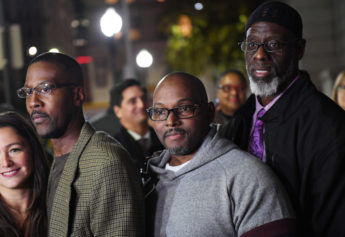
Lamonte McIntyre (left) stands with his mother, Rosie McIntyre, after having the murder charges against him dropped. (Photo by Tammy Ljungblad/The Associated Press)
The Kansas legislature has passed a law granting restitution for those who spent years in prison after being wrongfully convicted of crimes they did not commit.
The the proposed bill is now headed to Gov. Jeff Colyer’s (R) desk after gaining unanimous approval from lawmakers Thursday, the Wichita Eagle reported. If signed into law, qualified recipients would receive $65,000 for every year spent in prison. The state would also pay $25,000 for each year of parole, in addition to other benefits, including state health care for roughly a year and tuition assistance for college.
“The state today has taken a step in saying ‘we recognize the horror, the waking nightmare’ and that we will compensate these exonerees,” Sen. David Haley (D-Kansas City) said in a statement. “It’s a proud day.”
Those wrongly convicted and released from jail prior to July 1 have until June 2020 to make a claim, the newspaper reported.
The proposed plan would help those like Lamont McIntyre, who spent 23 years behind bars after being tried and convicted in 1994 for a double murder he didn’t commit. McIntyre, 41, was exonerated and released in October only to learn he wouldn’t receive a penny from the state for his wrongful imprisonment. Kansas is one of 18 states that offers no restitution to wrongfully convicted persons after their release.
Under the proposed bill, however, McIntyre would be eligible for roughly $1.5 million, which includes a one-time payment of $373,000 and then $80,000 in yearly payments over the next 14 years, according to the Wichita Eagle. When asked about the compensation, McIntyre called it a “good start.”
“It will be helpful,” he told the paper. “It’s great for something to be done for a person in that situation. After being gone for decades in prison, you need help with health care. You need stability. You need insurance. You need Social Security. You need something to set you up and not be so far behind in life.”
“I look at my life; I’m starting my whole life at age 41,” McIntyre added.
While he’s happy about Kansas finally granting restitution, the formerly imprisoned man asked folks to consider whether there’s truly any amount of money to fully repay someone who unjustly lost years of their life behind bars.


